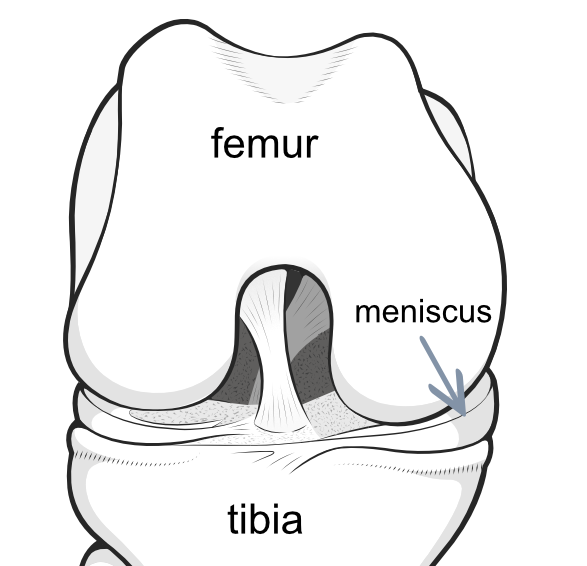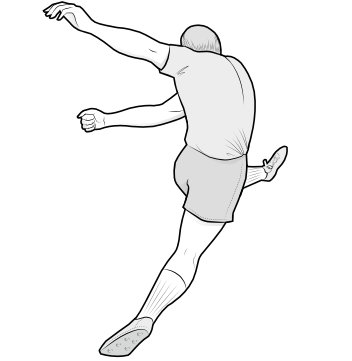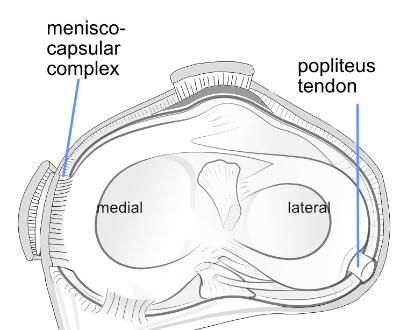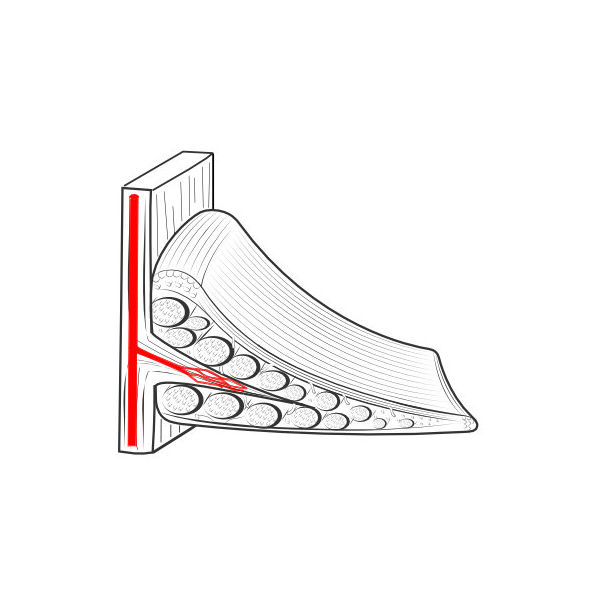A torn meniscus is a split through the fibres and matrix of the shock absorber of the knee.
 Page updated January 2024 by Dr Sheila Strover (Clinical Editor)
Page updated January 2024 by Dr Sheila Strover (Clinical Editor)

The two menisci are crescent-shaped and cushion the space between femur and tibia on either side of the joint.

This illustration shows a longitudinal tear of the meniscus, which is likely to result in instability.
How meniscus tears occur

In a healthy young person the meniscus can be torn without impact or with impact. A classic non-impact injury may be the result of the foot being planted while the body is twisted with force. In an older person, where there may be pre-existing degenerative changes, a relatively small event may lead to a tear.
Torn meniscus symptoms
Usually the patient with a torn meniscus remembers:
- an injury that involved a twisting motion, commonly a twist of the body with the foot planted on the ground, like a footballer kicking.
- an audible noise at the time of injury
- marked swelling of the knee soon after the injury.
- pain in the joint line and continuing feelings of instability even after the acute stage has settled.
Older patients with degenerative tears may not recall a recent specific injury, but may notice that the knee is often painful and may feel unstable.
Medial or lateral meniscal tear - which is worse?

Lateral meniscus tears are less common than medial meniscus tears, and the outcomes are different. Lateral tears tend to have a worse outcome because:
- the lateral meniscus absorbs about 70% of the shock going through the joint.
- the lateral meniscus is more mobile as there is less connection to the top of the tibia bone. There is actually a big gap where the popliteus tendon runs. Normally this is no problem, but tears running into this gap can reduce even further the connection to the tibia and this may significantly increase knee instability.
Will a torn meniscus heal without surgery?
Healing of a tear in the meniscus without surgery will depend upon a number of factors:

- the shape of the tear - radial tears and horizontal cleavage tears heal poorly (if at all)
- how close the tear is to the inner rim - there is no blood supply in the inner rim. Tears close to the outer rim, where the blood supply is good, heal more efficiently (see cross-section of the meniscus on the right)
- the size of the tear - large tears may lead to more displacement of the edges, so they cannot heal. A 'bucket-handle' tear may have a displacement of the torn part right to the other side of the rounded condyle
-
Quote from peer-reviewed paper:
"The vascular supply of the knee joint plays a major role in the healing and repair....Therefore, identifying the correct location of the lesion will contribute to an optimal treatment plan.... "
Citation: Luvsannyam E, Jain MS, Leitao AR, Maikawa N, Leitao AE. Meniscus Tear: Pathology, Incidence, and Management. Cureus. 2022 May 18;14(5):e25121. doi: 10.7759/cureus.25121. PMID: 35733484; PMCID: PMC9205760.
How surgeons fix a torn meniscus
If the surgeon assesses the meniscus tear and feels that it is in the patient's best interest to repair it, he/she can use sutures (stitches) or small devices shot through the torn edges and hold the edges together until healing occurs - this is called meniscal repair. If it is not feasible to repair a large tear, the surgeon may perform a partial meniscectomy or in desperate cases even a total meniscectomy.
-
Quote from peer-reviewed paper:
"While conservative management has its role and can be indicated in cases with advanced osteoarthritis or in patients with small tears, partial meniscectomy continues to be the most performed procedure for meniscal injuries. While its efficacy is a matter of debate, its short learning curve and acceptable short-term results have deterred many orthopedic surgeons to switch to more effective procedures. Meniscal repairs have grown in popularity over the past three decades...."
Citation: Bhan K. Meniscal Tears: Current Understanding, Diagnosis, and Management. Cureus. 2020 Jun 13;12(6):e8590. doi: 10.7759/cureus.8590. PMID: 32676231; PMCID: PMC7359983.
-
Quote from peer-reviewed paper:
"Although meniscal repair has shown promising results and a low short-term failure rate, the long-term failure rate is reported to reach up to 30% consistently.... "
Citation: Luvsannyam E, Jain MS, Leitao AR, Maikawa N, Leitao AE. Meniscus Tear: Pathology, Incidence, and Management. Cureus. 2022 May 18;14(5):e25121. doi: 10.7759/cureus.25121. PMID: 35733484; PMCID: PMC9205760.
Forum discussions
Types of meniscus tear -
- Radial tear
- Longitudinal tear
- Bucket-handle tear
- Horizontal cleavage tear
- Parrot-beak tear
- Flap tear
- Ramp lesion
Meniscus symptoms -
Tests for torn meniscus...
Meniscus surgery -
- Meniscal repair
- Meniscal repair augmentation
- Meniscal trimming
- Partial meniscectomy
- Meniscectomy
- Meniscal replacement
 2012 - Medial meniscus tear - a typical story - by Professor Adrian Wilson (Knee Surgeon) (Knee Surgeon)
2012 - Medial meniscus tear - a typical story - by Professor Adrian Wilson (Knee Surgeon) (Knee Surgeon)
Notes from knee surgeons -
- 2011 - Meniscal tears - decisions regarding repair - by Professor Adrian Wilson (Knee Surgeon)
- 2008 - An update on state-of-the-art surgery for the menisci - by Dr (Mr) Ian McDermott (Knee Surgeon)
- 2007 - Surgical decision on which meniscal tear to repair - by Dr (Mr) Ramakrishnan (Ram) Venkatesh (Knee Surgeon)
- 2004 - Meniscal Tears in Young People - by Dr Frank R Noyes (Knee Surgeon)
Peer-reviewed paper -
- 2020 - Management of traumatic meniscus tears: the 2019 ESSKA meniscus consensus - summarised for KNEEguru readers by Dr Sheila Strover (Clinical Editor)
Professor Adrian Wilson examines a patient with a torn medial meniscus.
 2019 -
2019 -